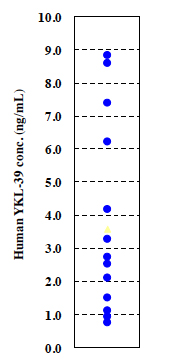CircuLex Human YKL-39 ELISA Kit
Product Code:
MBL-CY-8087
MBL-CY-8087
Host Type:
Human
Human
Regulatory Status:
RUO
RUO
Application:
Enzyme-Linked Immunosorbent Assay (ELISA)
Enzyme-Linked Immunosorbent Assay (ELISA)
Shipping:
4°C
4°C
Storage:
4°C
4°C
No additional charges, what you see is what you pay! *
| Code | Size | Price |
|---|
| MBL-CY-8087 | 96 Assays | £631.00 |
Quantity:
Prices exclude any Taxes / VAT
Stay in control of your spending. These prices have no additional charges, not even shipping!
* Rare exceptions are clearly labelled (only 0.14% of items!).
* Rare exceptions are clearly labelled (only 0.14% of items!).
Multibuy discounts available! Contact us to find what you can save.
This product comes from: United States.
Typical lead time: 10-14 working days.
Contact us for more accurate information.
Typical lead time: 10-14 working days.
Contact us for more accurate information.
- Further Information
- Documents
- References
- Show All
Further Information
Background:
YKL-39, also known as chitinase 3-like 2, is secreted chitinase-like protein which contains Glyco_18
domain with no chitinase catalytic activity but with putative lectin properties (1, 2). In contrast to its
closest homologue YKL-40, YKL-39 is not a glycoprotein. YKL-39 is secreted by articular
chondrocytes, also synoviocytes (3) and activates signal-regulated kinases ERK1/ERK2 in human
embryonic kidney cells (4). Increased levels of YKL-39 have been demonstrated in synovial fluids of
patients with osteoarthritis (OA) or rheumatoid arthritis (RA) (5, 6) as well as in malignant tumors,
particularly in glioblastomas (7). It is currently recognized as a biomarker for the activation of
chondrocytes and the progress of the osteoarthritis in human (5). In addition, autoantibodies to YKL-39
were detected in 8?11.8% of patients with RA (8, 9), and 11.1% of patients with OA (9), while only 1%
of patients with RA had autoantibodies to YKL-40 (8).
Maturation of monocyte derived macrophages in the presence of Th2 cytokine IL-4 and TGF-beta
leads to the strong activation of YKL-39 expression. Thus elevated levels of YKL-39 observed during
chronic inflammations can not be attributed solely to the activity of chondrocytes. In perspective,
YKL-39 is also proposed as a useful biomarker to detect macrophage-specific response in tumor,
atherosclerosis and neurodegenerative diseases including Alzheimer disease, in addition to the
chondrocyte-specific activation.
Description:
The CycLex Research Product CircuLex Human YKL-39 ELISA kit is used for the quantitative
measurement of human YKL-39 in serum, plasma, cell culture medium and other biological media.
Kit Components:
Microplate, 10X Wash Buffer, Dilution Buffer, Human YKL-39 Standard, HRP conjugated Detection Antibody, Substrate Reagent, Stop Solution
Measurement Range:
37.5 pg/mL~2400 pg/mL
Sensitivity:
better than 35.1 pg/mL of sample.
Target:
YKL-39
Documents
References
1. Funkhouser, J.D. and Aronson, NN. 2007. Chitinase family GH18: evolutionary insights from the
genomic history of a diverse protein family. BMC Evol. Biol., 7: 96.
2. Kzhyshkowska, J., Gratchev, A. and Goerdt, S. 2007. Human Chitinases and Chitinase-Like
Proteins as Indicators for Inflammation and Cancer. Biomarker Insights, 2: 128.
3. Hu, B. Trinh, K. Figueira, WF. Price, PA. 1996. Isolation and sequence of a novel human
chondrocyte protein to mammalian members of the chitinase protein family. J Biol Chem., 271:
19415.
4. Areshkov, PA. and Kavsan, VM. 2010. Chitinase 3-like protein 2 (CHI3L2, YKL-39) activates
phosphorylation of extracellular signal-regulated kinases ERK1/ERK2 in human embryonic
kidney (HEK293) and human glioblastoma (U87 MG) cells. Tsitol Genet., 44: 3.
5. Knorr, T. Obermayr, F. Bartnik, E. Zien, A. Aigner, T. 2003. YKL-39 (chitinase 3-like protein 2),
but not YKL-40 (chitinase 3-like protein 1), is up regulated in osteoarthritic chondrocytes. Ann
Rheum Dis., 62: 995.
6. Steck, E. Breit, S. Breusch, S.J. et al. 2002. Enhanced expression of the human chitinase 3-like 2
gene (YKL-39) but not chitinase 3-like 1 gene (YKL-40) in osteoarthritic cartilage. Biochem.
Biophys. Res. Commun., 299: 109.
7. Kavsan, V. Dmitrenko, V. Boyko, O. et al. 2008. Overexpression of YKL-39 Gene in Glial Brain
Tumors. Scholarly Research Exchange, 2008, Article ID: 814849, doi:10.3814/2008/814849.
8. Sekine, T. Masuko-Hongo, K. Matsui, T. et al. 2001. Recognition of YKL-39, a human cartilage
related protein, as a target antigen in patients with rheumatoid arthritis. Ann. Rheum. Dis., 60: 49.
9. Tsuruha, J. Masuko-Hongo, K. Kato, T. et al. 2002. Autoimmunity against YKL-39, a human
cartilage derived protein, in patients with osteoarthritis. J. Rheumatol., 29: 1459.



